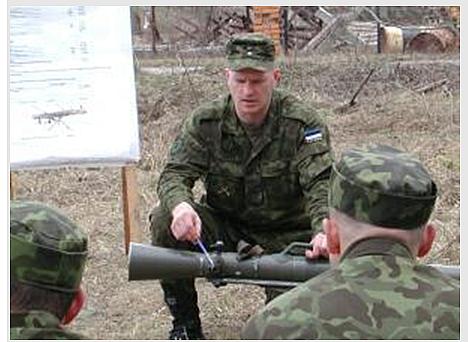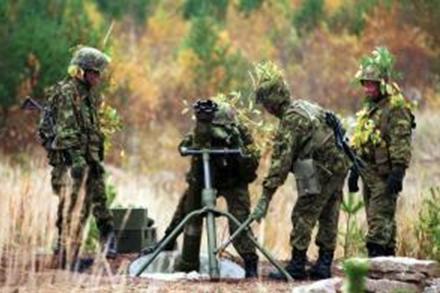The Constitution of the Republic of Estonia foresees compulsory military service in the Defence Forces of all physically and mentally healthy male citizens.
The duration of the compulsory military service is 8 or 11 months, depending on the education and position provided by the Defence Forces to the conscript. In the compulsory military service conscripts acquire basic knowledge necessary for them to act as specialists in wartime military units.
Conscription to the compulsory military service is conducted on the territorial principle. Conscripts originating from one area study together in one unit. When sent to the reserve, they make up one reserve unit led by commanders who have been trained during the compulsory service and who come from the same unit.
After the compulsory military service reservists are called up for trainings for reserve in every five years. There the skills mastered during the compulsory service are reinforced and new arms and equipment are introduced.
What you learn in the compulsory military service?
8-month service:
Soldier's basic course (SBC) - 12 weeks
In the first months of the service soldiers acquire the main skills of a single fighter.
In the basic course you learn about arms, orientation and first aid, you also acquire skills for forest camps, knowledge about the basics of tactics, behaviour in the Defence Forces and legislation.
The level of basic knowledge is checked with a theoretical and practical soldier's exam. Those who pass it successfully are awarded a badge.
Soldier's specialty basic course (SSBC) - 6 weeks
The soldier's specialty basic course provides knowledge and skillsnecessary for such specialists as riflemen, machine gunners, anti-tank grenade launchers, drivers, paramedics, etc. The length of the course depends on the complexity of the specialty. The specialty training terminates with a 3-week combat pair course where conscripts train the performance of combat tasks as members of combat pairs.
Unit course (UC) - 17 weeks
The course teaches co-operation as a member of a squad, platoon, company and battalion
11-month service:
Those conscripts who select the 11-month service option take longer specialty courses. This applies to conscripts who graduate from the junior NCO course or reserve officer course, pass signals or IT training, or serve on the ships of the Navy.
What will happen to you after the compulsory military service?
The Estonian Defence Forces are a reserve force and, if necessary, Estonia will be defended by units formed of reservists.
During the compulsory military service you acquire basic knowledge of national defence and are provided training to enable you to fight as a member of a consolidated team. After the compulsory military service you are sent to the reserve and your actual service as a defender of Estonia starts.
As a reservist you may be called up for training at a unit, training centre or defence force educational institution. You may be called up for trainings no more frequently than once in three years. At reserve trainings the knowledge and skills acquired in the compulsory military service are refreshed. As the technology and requirements in the Defence Forces are changing, it is necessary for the reserve to keep up to date and to learn to know and handle new technology. You are going to be called up to reserve trainings together with the people with whom you were in the compulsory military service.
Junior NCO course - 8 weeks
The course is divided in two: the NCO basic course of 4 weeks and the NCO specialty course of 4 weeks.
The basic course gives the future NCOs kernel knowledge necessary for a squad commander. The specialty course teaches a definite specialty, such as anti-tank action, fire control or signals and leadership of the respective teams.
The objective of the junior NCO specialty course is to teach the performance of a squad commander's tasks in peacetime and wartime, i.e. to lead a 10-man squad. A great emphasis is laid on practical exercises.
In the junior NCO specialty course conscripts can supplement their knowledge in the tactics of squad combat (defence, attack, guerrilla war, ambush), pedagogy, military psychology, leadership, combat engineering, medicine and signals, they are also taught to apply the above skills as squad commanders. The squad commander course ends with an NCO examination.
In the course of the squad commander course suitable candidates for reserve officer courses are selected.
Reserve officer course for conscripts
In the reserve officer course conscripts who have passed the junior NCO course learn to command a platoon or four squads in peacetime and wartime conditions. In this course the earlier knowledge is supplemented by in depth training in platoon tactics, military psychology, leadership, medicine, signals, pioneer operations, infantry anti-tank action and other subjects. The reserve officer courses are held by the Battle School of the Defence Forces in Võru at Meegomäe. Every graduate of the NCO or reserve officer course has the right to apply for studies in the Military Academy.
Women and compulsory military service
Women in active duty and specialty areas represented 11.4% of the military in 2013. Women have been serving in the military since its initial conception. As of April 1 2013 the new Defence Forces Service Act states that women can serve in the compulsory service and later have a career in the military on equal terms with men.
It is imperative for the military that the service has the top and best suited candidates. The new uniform compulsory service insures that all military personnel start off at the same level, are given equal opportunities to show their strengths and abilities and be able to later excel in their careers. In the service all are equal regardless of their origins, race, gender, residence or place of schooling. The compulsory service is a base where future military leaders are chosen.
A commitment to the military is a serious obligation for a lifetime. A reservist retires from service at 61 year of age. Those that have chosen a pledge to service can renege on their promise within the first three months; thereafter they are bound to the full time of their commitment. Those that fulfill a long time dedication to duty are praise worthy.


